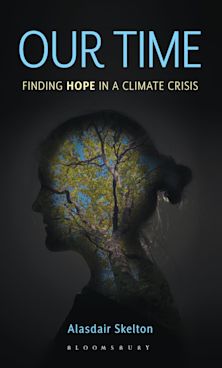Gratifying Transitions
Maintaining Wellbeing in the Face of Climate Change
Gratifying Transitions
Maintaining Wellbeing in the Face of Climate Change
This product is usually dispatched within 2-4 weeks
- Delivery and returns info
-
Flat rate of $10.00 for shipping anywhere in Australia
Description
Concerns for future human wellbeing play a central role in climate change debate and policy making but have received scarce attention in climate change ethics. Gratifying Transitions: Maintaining Wellbeing in the Face of Climate Change remedies this by considering whether and how we can live a good and satisfying life under constraints caused by climate change. Drawing on behavioral psychology and theories of self-cultivation, the author argues that green transition requires that we work actively with wellbeing, as moral beliefs, knowledge about climate change, or new understandings of the relationship between humans and nature are unlikely to bring about the necessary changes in behavior. Contrary to a widespread view, the author further argues that subjective wellbeing rather than basic needs satisfaction is the most appropriate notion of wellbeing for addressing climate change issues. The book contains both detailed philosophical arguments and concrete guidelines for how to foster a transition to more sustainable, but still sufficiently rewarding, ways of living, individually as well as collectively.
Table of Contents
1.1 The role of wellbeing in responding to climate change
1.2 Wellbeing and change
1.3 Wellbeing, motivation and action
1.4 Views on the relationship between climate change, climate action and wellbeing
1.4 Why not gamble on green growth?
1.5 Why not just politics?
1.6 Wellbeing for whom?
1.7 An interdisciplinary, philosophy-driven approach
Chapter 2: Life in the Future
2.1 The ubiquity of change
2.2 Change for better or worse?
2.3 Going through changes
2.4 Quantity and quality of change
2.5 Living with climate change
2.6 Living with mitigation
Chapter 3: A Theory of Wellbeing for Green Transition
3.1 A plethora of theories and a provisional assessment
3.2 Problems with subjective wellbeing? Immeasurability, growth ideology and adaptation
3.3 Virtues of subjective wellbeing
3.4 Growth ideology and individualism?
3.5 Why not a needs approach?
3.6 Genuinely basic needs?
3.7 Adaptation for good and for bad
3.8 Richer and poorer lives
3.9 Getting the most out of it: Cultivation as the key?
3.10 Putting it together: A theory of wellbeing for green transition
Chapter 4: Living with Change
4.1 Remaining, losing and becoming yourself
4.2 The shape, meaning and management of life
4.3 Temporal styles and agents of change
4.4 Keeping the good things alive – variation as the key to wellbeing?
4.4 Values and impacts of personal change
Chapter 5: Shaping behavior: Self-control, cultivation and emulation
5.1 The bad news: How not to change behavior
5.2 The (somewhat) better news: How we might change behavior
5.3 Limits of behavioral design
5.4 Bildung to the rescue?
5.5 Getting it right: Bildung and the situationist challenge
5.6 Bildung and behavior change as social process
5.7 Return of the environmental humanities?
Chapter 6: Acceptable Transitions
6.1 Only soft interventions?
6.2 Goodbye to liberalism?
6.3 Harm and sustainability
6.4 Learning from the pandemic
6.5 Realism, but not too much: Balancing feasibility concerns and the role of hope
6.6 Moral aesthetics
6.7 Unjustified interventions?
Chapter 7: Changemaking: Gratifying transitions and strategies for green transition
Coda: Living with change in an uncertain world
References
About the Author
Product details

| Published | 22 Jan 2026 |
|---|---|
| Format | Hardback |
| Edition | 1st |
| Extent | 240 |
| ISBN | 9781666914412 |
| Imprint | Bloomsbury Academic |
| Dimensions | 229 x 152 mm |
| Series | Key Issues in Climate Change and Sustainability: Ethics, Politics and Policy |
| Publisher | Bloomsbury Publishing |


































